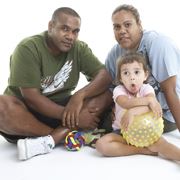Why listening is important for communication
Listening can lead to a better understanding between you and your partner and can strengthen your long-term relationship. Listening also makes it easier for you to solve problems together, and to be consistent in how you behave towards your children.
This makes raising children easier, and benefits your whole family.
Listening is also important in helping your children develop the skills they need for life. They learn from seeing what you do and say, including how you relate to and communicate with each other.
Listening and communication basics
Good listening starts with simple steps like:
- looking for ways to really pay attention when your partner speaks
- encouraging your partner to talk
- showing that you understand your partner’s perspective – even when you don’t agree with it
- waiting until your partner finishes speaking before giving your own opinion.
Tips for listening
Stop what you’re doing
If your partner needs to talk, stop what you’re doing so you can look at your partner and give full attention to your partner’s words and body language. You can show your partner that you’re giving full attention by:
- facing your partner
- nodding to show that you’re listening
- making sure your arms are uncrossed.
If you’re too distracted to listen, say so, and set another time to talk.
Save questions or comments for later
Wait until your partner pauses before you speak, even if there’s something you don’t understand. The idea is to avoid distracting your partner.
Focus on understanding your partner’s views and feelings
Avoid jumping in with ‘Yes, but’ as a way of explaining your perspective. Let your partner finish the point.
Ask open-ended questions
Open-ended questions encourage your partner to talk and describe feelings or views instead of giving a yes or no answer. For example, ‘Tell me about … ’.
You can give your partner positive feedback and ask some questions to try to understand what your partner is saying. But avoid too many questions – this can sound like an interrogation.
Confirm your understanding
Restate your partner’s comments in your own words. For example, ‘It sounds like you’re feeling stressed about being responsible for school pick-ups every day’.
This helps to confirm whether you understand the issue and your partner’s feelings.
Ask for clarification
Asking for clarification shows that you’re interested in finding out more about your partner’s views and feelings.
For example, ‘I get the feeling that you’re frustrated with the way this has been going’. Be genuine – your partner will know when you’re really interested.
Avoid assumptions
Try not to assume that your partner is being hurtful, or is the one with the problem. If your partner says or does something hurtful, look for positive or neutral intentions behind it.
Getting help
If you’re having trouble getting these suggestions to work for you, you could try couple counselling. Relationships Australia offers counselling services around the country.


